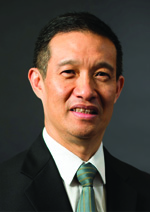 Professor Kenneth Kwek is the Chief Executive Officer of Singapore General Hospital (SGH). SGH was established in 1821, and celebrates her bicentenary in 2021. Every year, about 1 million Singaporeans benefit from advanced medical care delivered by our 800 specialists, and SGH works with all other institutions in the SingHealth cluster to advance clinical excellence, research and education.
Professor Kenneth Kwek is the Chief Executive Officer of Singapore General Hospital (SGH). SGH was established in 1821, and celebrates her bicentenary in 2021. Every year, about 1 million Singaporeans benefit from advanced medical care delivered by our 800 specialists, and SGH works with all other institutions in the SingHealth cluster to advance clinical excellence, research and education.
Prior to his appointment as CEO, SGH, Prof Kwek was CEO of KK Women’s and Children’s Hospital, Singapore’s largest and only hospital dedicated to women’s and children’s health. He is an obstetrician specializing in Maternal Fetal Medicine, with a clinical interest centered around care for high risk pregnancies, particularly preterm labour, cervical incompetence, pre-eclampsia as well as post partum hemorrhage.
Prof Kwek is passionate about improving the quality of patient care and harnessing process re-engineering, innovation and technology to enhance the safety and reliability of clinical care and patient outcomes. In July 2017, Prof Kwek was concurrently appointed Deputy Group Chief Executive Officer (Organisational Transformation & Informatics), SingHealth.
Presentation Synopsis
COVID-19 – Our Experience In and Beyond SGH
Pandemic preparedness is an essential component of hospital risk management. The scale, velocity and impact of the COVID-19 pandemic are unprecedented, requiring adaptive strategies in our preparedness and response planning in an attempt to remain “one step ahead” of the rapidly unfolding pandemic.
Concerns relating to capacity, capability, culture and command, challenge us to respond to unanticipated situations while mapping out scenarios to be prepared for next waves and evolving demands. A major shift in strategy occurred when we undertook large scale operations beyond the walls of the hospital, running medical posts in dormitories, isolation facilities in converted hotels, a 3200-bed community care facility as well as deploying swab testing and phlebotomy teams for community screening.
Our people have been key throughout our response and planning in this pandemic. It has been critically important to continue engagement, support, enablement and encouragement for our colleagues, building on their strong clinical grounding and deep experience to build resilience and a continued willingness to step up to challenges.
As the situation continues to evolve, we are beginning to envision the new normal. This requires a focus on enhanced infection prevention measures and safe distancing initiatives, while addressing altered expectations from all stakeholders. We need to continue to deliver a high level of holistic care to all our patients, creating a new system of care, with renewed vigilance and a heightened readiness to respond swiftly when needed.